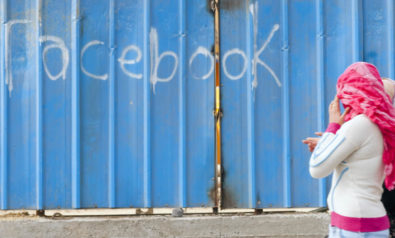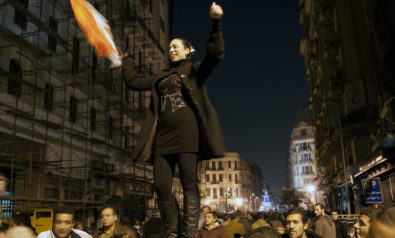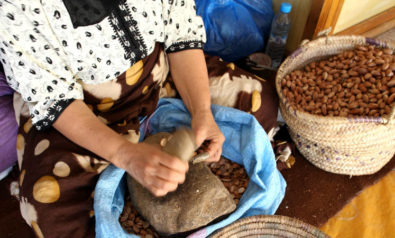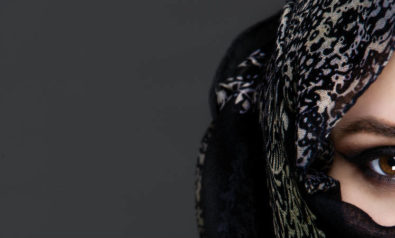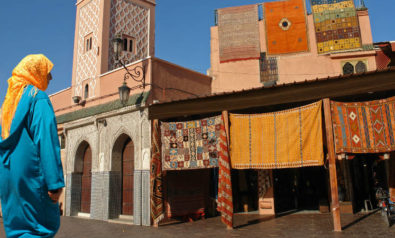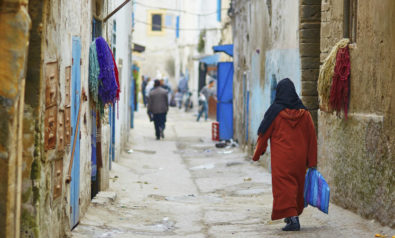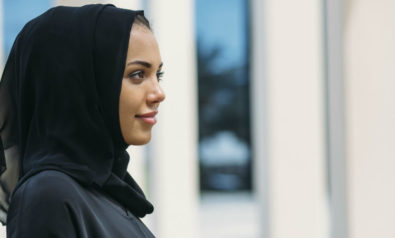Women in the Middle East and North Africa are the fulcrum of change.
Mariam finally settles herself down on the floor after distributing pink cups of Arabic coffee to her guests. With a pink floral scarf and soft hands, she is similar to many middle-aged women we have encountered in our walk around the Palestinian refugee camp where she lives. But this woman is different. Mariam has worked with disabled individuals in the camp for 30 years.
Persons with disabilities are among the most vulnerable in conflict or post-conflict situations. They cannot evacuate or access assistive devices. Mariam, taking a stipend of 100 Jordanian dinars ($140) per month, visits homes voluntarily to provide physical therapy to patients who are immobile. In the gravel-ridden streets of Jerash Camp in Jordan, Mariam attended trainings on her own and pursues the work on her own initiative.
Outwardly, this might seem surprising. Mariam is a woman. She is also disproportionately vulnerable to and potentially affected by disaster or displacement—women and children are 14 times more likely to die in a disaster. Mariam’s household would not survive rising food costs, economic hardship if someone could not work, or another displacement. Despite her family’s lack of economic resilience, however, Mariam still invests her time into those who face even more precarious odds.
Women in Disaster
As the Red Cross suggests, women are “surprisingly strong” and “remarkably ingenious” at coping with disaster or war. Frequently, women are the ones left behind to recover communities after conflicts have run their course.
This is why women are the new key investment in disaster risk management. The concept of relief work post-disaster is not new. In fact, everyone has seen advertisements asking for aid to assist populations struck by famine or war.
Preventative investment, however, focusing particularly on fostering the resilience of communities, is new. Women like Mariam form the epicenter of this strategy, a shift away from strictly “relief” work.
The Middle East and North Africa (MENA), a current host of millions of refugees and containing several conflict-ridden nations, need prevention more than anything else. In order to keep countries like Jordan, where Mariam lives, the MENA region must invest in a strategy to help invoke the power of its female labor force. Only 21.3% of women work, and female entrepreneurs, in particular, face obstacles such as “access to credit and networks, mobility constraints, and security,” according to the World Bank.
Yet for both entrepreneurship and for life, resilience is a key ingredient. Women, for myriad reasons, have shown in studies to innately possess higher resilience and a high aptitude for learning resilience in leadership.
Fighting Against the Odds
Lina Khalifah is another example of this entrepreneurial female spirit. Lina started SheFighter, a hot pink gym strictly for women, from the ground up with her passion for teaching self-defense to women in Jordan.
With a gamine smile and an athlete’s walk, Lina sits down for an interview while the girls in SheFighter playfully attack each other during a training break in the background.
“I was pissed off for women in Jordan. Some of them are so weak, they don’t have a voice—we are a very male dominated society.”
“You know, they say ‘Women can’t go outside alone because they’re a girl, you can’t travel for sports because you are a girl.’” Lina shakes her head, at this point, frustrated. With savings and help from her father, Lina began SheFighter—an enterprise that has now grown enough that Lina has been invited to speak on several international forums.
“I started with just a few girls and now look. We have so many girls and we can train more to be trainers,” Lina says as she smiles. “I began SheFighter because of my friend who was abused. You know, her father hit her and I asked her, ‘Why don’t you defend yourself?’ But people told me I was creating a problem in the family. I have another friend whose father hit her with an ashtray and you know, she would not do anything back because he was her father. I said why don’t you defend yourself?”
At 32, Lina’s success is both impressive and an exemplar of how difficult it can be for a woman with an idea to succeed in a society where norms are changing slowly. While investment is key for women to develop as entrepreneurs and within the labor force, without training, networking building and incubation, it is difficult for a woman to get anywhere.
Learning about the gendered labor force divide in the MENA region is as simple as asking women to elaborate on an obstacle to their success. For some, it is internalized as they navigate their gendered identities and spaces. For others, it is externally imposed. In most cases, however, women require the support of a spouse or a father to truly get started in their business venture. Without this, it is difficult to access the capital and networks that men more easily acquire.
Battling for Success
Lina Fayyad, a former mixed martial arts (MMA) fighter and kickboxing competitor in Jordan, agrees. She co-owns Insanity Gym, a brand-new street-inspired yellow gym, with her fiancé. With bright red hair, big eyes and a charming smile, Lina does not come across like a competitive fighter but she has an impressive fan following in Jordan.
 Fair Observer provides you deep and diverse insights for free. Remember that we still have to pay for servers, website maintenance and much more. So, donate now to keep us free, fair and independent.
Fair Observer provides you deep and diverse insights for free. Remember that we still have to pay for servers, website maintenance and much more. So, donate now to keep us free, fair and independent.
“In the beginning, my [all male] teammates were confused like, ‘What is this girl doing here?’ But my coach was very supportive.’”
Now consumed with personal training young women and men at her gym, Lina also employs male Jordanian MMA fighters to help teach some of her classes, and she has their clear respect. Yet even coming from such an extreme, outside perspective, Lina needed the support of men to gain her place.
Perhaps this is one of the overlooked keys in MENA: women often require, whether for good or ill, the support of men to succeed even if they can do it on their own merit. This may be a leftover of changing societal norms or evolving patriarchal structures, but the trend is there and present in almost every situation.
A Women’s Economy of Sharing in the Middle East
Back in the refugee camp, when I ask why she does the work, Mariam smiles and says, in Arabic, “We are all human.” This capacity-building power of women, exemplified in Mariam’s desire to bring together and help those even less fortunate than herself, is a role that women perform extremely successfully.
The proven ability, as leaders, to reach out to others and collaborate on work is why women are the clearest option to establish preventative community resilience. With more female entrepreneurs who can start their businesses without the necessary assistance or intervention of men comes community stability and growth.
As in the case of Mariam, Lina Khalifah or Lina Fayyad, women who are given the smallest opportunity share their ideas and, in turn, empower others, especially women. While the Middle East and North Africa sit on the cusp of precarious times, it is this reverberation of agency that is needed urgently in the region.
The views expressed in this article are the author’s own and do not necessarily reflect Fair Observer’s editorial policy.
Photo Credit: Safak Oguz
Support Fair Observer
We rely on your support for our independence, diversity and quality.
For more than 10 years, Fair Observer has been free, fair and independent. No billionaire owns us, no advertisers control us. We are a reader-supported nonprofit. Unlike many other publications, we keep our content free for readers regardless of where they live or whether they can afford to pay. We have no paywalls and no ads.
In the post-truth era of fake news, echo chambers and filter bubbles, we publish a plurality of perspectives from around the world. Anyone can publish with us, but everyone goes through a rigorous editorial process. So, you get fact-checked, well-reasoned content instead of noise.
We publish 2,500+ voices from 90+ countries. We also conduct education and training programs
on subjects ranging from digital media and journalism to writing and critical thinking. This
doesn’t come cheap. Servers, editors, trainers and web developers cost
money.
Please consider supporting us on a regular basis as a recurring donor or a
sustaining member.
Will you support FO’s journalism?
We rely on your support for our independence, diversity and quality.



